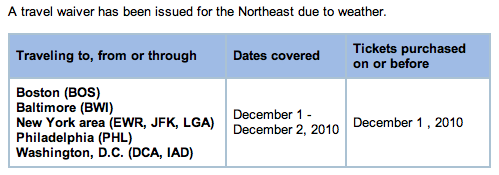The snowflakes are falling in parts of the country, making this a good time to bring up the power of airline travel waivers. Generally, these policy exceptions are issued by airlines when known weather systems or other operational disruptions will prevent the majority of a carrier’s flights from operating on-time, or at all. They are targeted to the regions of the country being affected, and most are specific down to the airport. Not just a winter phenomenon, actually, as they seem to be more prevalent during summer thunderstorms. United Airlines issued one yesterday for the Northeast, so I’ll use that as the example.
For people traveling to/from or connecting through Baltimore, Boston, New York, Philadelphia or Washington D.C. today (or yesterday), they have a couple of options available to them should their flights be delayed or cancelled. Assuming their ticket was purchased on/before 12/1/10, they can change to a different flight (same origin & destination) within 7 days of the original impacted flight without penalty. The new flight should have the same booking code, or fare bucket available, and if not you’d be responsible for any fare difference if you haven’t started travel yet. If your flight is cancelled, you are eligible for a full-refund even on non-refundable fares.
The terms of these exceptions can, and do change depending on the circumstances, so it can pay to check back often. And the terms and timing of the waivers vary greatly by airline. Last winter, United Airlines was incredibly proactive in cancelling flights even 24-hours out due to some storms. I happily had my ticket refunded and called it a wash without having to deal with the headache of a busy terminal. During that same storm, Delta waited so long to issue a waiver that my friend lost the full value of his ticket. Their waiver wasn’t issued until after he boarded his first flight. He arrived at his connection city to find his next flight was canceled and the waiver was finally issued. He got a flight back home and a sorry $50 voucher for his wasted trip.
Financially the waivers save you the change fee (usually $150), but they also save a bit of your sanity by keeping your stress down and even offer up opportunities for creative re-routes. Let’s hope this winter season brings smoother travel and proactive responses to forecasted storm tracks by all airlines.



[…] than a year ago, I posted some general information about travel waivers and now that they’re increasing in frequency with […]